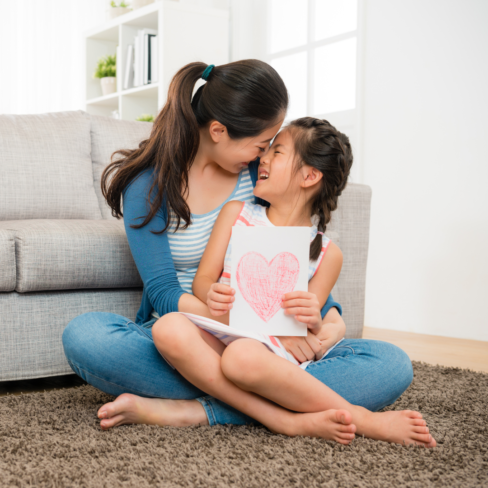

Therapist Corner: Parenting While Struggling with Your Mental Health
I’m a Clinical Intern at Kids In The Middle as part of my Master of Social Work program. My professional time as a therapist is just beginning, and I often reflect on my own experiences when helping clients. My parents went through a long divorce when I was a young teenager, giving me a first-hand look at how loving parents can crumple under the stress. When I became a stepparent at 24, I eagerly took on the role and was committed to supporting my stepdaughter. But I worried that my own mental health struggles would make me an inconsistent parent. How could I provide stability when I often feel mentally and emotionally drained?
Two years into being a full-time parent, I have by no means mastered this. However, I’ve discovered four fundamental truths for parenting when struggling with your mental health:
1. You can’t push your feelings down forever. Let’s be honest—we think that if we push our feelings down, we’ll be able to keep going indefinitely. This never ever works long-term. Even if we avoid breaking down or yelling at someone, our mood and behavior are worse when we ignore our own needs. And this harms our relationships with everyone, especially our kids. Additionally, pushing down our feelings is ultimately pointless because…
2. Your kid(s) can probably tell you’re suffering. We’re not as sneaky as we think. I grew up with a mom who would put on a brave face, then cry behind closed doors. My stepdaughter always notices when I’m stressed. She knows that my silence means that something is wrong, and she can read it on my face even when I’ve plastered on a smile. Kids see way more than we wish. And this can be a problem because…
3. Your kid(s) may blame themselves for your struggles. Just as young kids may feel responsible for their parents’ separation, they may blame themselves for your bad mood. Kids facing their parents’ separation already deal with confusing and painful feelings. A kid prone to self-blame may see their parent upset or overwhelmed throughout the day and assume it’s their fault. If this happens, it’s vital to reassure your child that this is not the case. And this is possible because…
4. It’s okay to be open with your kid(s) about your mental health! Being open with your kids about your mental health provides opportunities to reinforce that your feelings are not their fault. If your kids can already tell you’re stressed or unhappy, providing context for your mood will help, not harm. There are, of course, appropriate ways to share your feelings. This is not an excuse to dump your emotions on your kids. When my stepdaughter notices I’m having a particularly bad day, I’ll use the format “I’m feeling especially X (e.g., frustrated, tired, sad) today because of Y, and when I’m feeling that way, doing Z can help me feel better.” In one sentence, I validate her observations, explain the cause (appropriately—if the cause is your co-parent, this is not permission to bash them with impunity), model self-care, and set expectations for what the rest of the day may look like because of my mood.
Ultimately, our own challenges are opportunities to model what our kids can do when they’re struggling. This is, of course, easier said than done. Amid divorce, separation, lawyers, and/or co-parenting, you may feel at the end of your rope and are doing whatever you can to get through each day. But I’ve found that being open about emotions I used to push down has made things easier for me and my stepdaughter. When we purposefully foster an accepting, validating, and responsive emotional environment, it’s easier for our kids to comfortably share their difficult feelings with us, now and in the future. Separation and family restructuring injects so much stress into already-struggling families. Mindfully acknowledging and responding to feelings can protect everyone involved and strengthen emotional bonds with your kids at a time when they (and you!) need it most.
-Caroline Murphy, KITM MSW Intern
